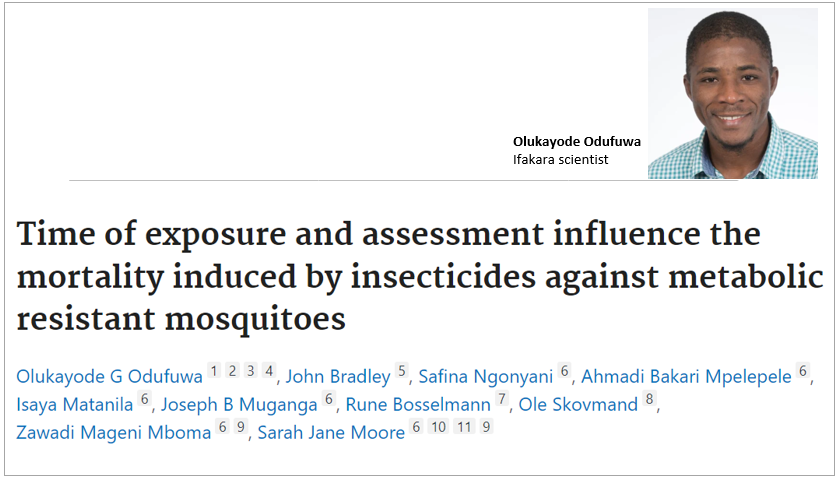
MALARIA RESEARCH: How timing influences mosquito resistance to insecticide

Daytime experiments can potentially be useful when testing insecticides against resistant mosquitoes; a new malaria study involving scientists from Tanzania, the UK, Denmark and France has shown.
Published on the Parasites & Vectors journal, the study underscores the importance of daytime experiments and hours of assessment of delayed mortality after exposure when evaluating the efficacy of insecticides, particularly against mosquitoes with metabolic resistance.
The study was conducted by a group of scientists from Ifakara Health Institute and the London School of Hygiene and Tropical Medicine (LSHTM), along with insecticide specialists from Vegro Aps in Denmark and MCC47 in France. Olukayode Odufuwa from Ifakara Health Institute is the lead author.
The study aimed to investigate the impact of time on the performance of ITNs against mosquitoes exhibiting metabolic resistance. Ultimately, the goal of the study was to contribute to the standardization of cone bioassay procedures for assessing new active ingredients (AIs) that may be metabolically detoxified or interfere with mosquito metabolism to restore the effect of an insecticide.
What are cone bioassay procedures?
A cone bioassay is a scientific technique used to test the effectiveness of insecticides or other compounds against mosquitoes. It involves exposing mosquitoes to the substance being tested within a cone-shaped container.
For this study, two cone bioassay experiments were done (in 2020 and 2023) at the Vector Control Product Testing Unit (VCPTU) facility of the Ifakara Health Institute in Bagamoyo, Tanzania, which is accredited with Good Laboratory Practice (SANAS GLP0003).
Learn more about cone bioassays here.
Through experiments following the World Health Organization (WHO) guidelines, the scientists examined the mortality rates of mosquitoes exposed to insecticide-treated nets (ITNs), testing the nets during different times of the day, including daytime and evening hours, and evaluating mosquito mortality either 24 or 72 hours after exposure.
Time of exposure matters
The results showed that the time of day matters when mosquitoes are exposed to insecticides. Findings revealed that mosquitoes resistant to insecticides exhibited significantly lower mortality rates when exposed to ITNs during the evening (30%) compared to daytime exposures (44%).
Moreover, mortality rates observed after 72 hours post-exposure were notably higher than those recorded after 24 hours for these resistant mosquitoes, suggesting that the time of day and the timing of mortality assessment are crucial factors when evaluating the effectiveness of ITNs against resistant mosquito populations, noted the scientists.
Why does timing matter?
In their discussion about these findings, the scientists attributed mosquitoes' reaction to insecticide to “Circadian Rhythm”, some kind of internal clock, that governs mosquito activities.
“Circadian rhythm governs activity in mosquitoes including mating and locating resources (food) such as sugar, hosts (to bite) and oviposition (laying eggs). All of these behaviors require flight that is energetically demanding, and many genes are upregulated in the evening and night when mosquitoes are more active, resulting in the upregulation of one or more detoxification enzymes that affect mosquito resistance to pyrethroids and DDT,”explained the scientists.
“This is the likely reason for the observed lower mortality of mosquitoes that were exposed to insecticides during the evening (30%) than during the day (44%) among the mosquito strains known to have metabolic resistance to pyrethroids,” they added.
In this particular study, the scientists used nocturnal mosquitoes that are more active at night. These mosquitoes increase the activity of specific genes during nighttime, enhancing their resistance to insecticides.
Differential effects on mosquito species
The study also found variations in susceptibility among different mosquito species. Some mosquitoes became more vulnerable when exposed to a chemical called PBO, but others didn't respond as well, suggesting that there might be additional factors contributing to resistance in certain mosquito types.
Challenges with testing insecticides
Some challenges with the cone bioassay method used to test insecticides were observed during the experiments. The scientists noticed that the traditional cone bioassays may not accurately reflect the efficacy of insecticides. To get more accurate results, they emphasize the importance of standardizing cone bioassays by conducting them at consistent times, especially in the evening or night, to obtain more reliable estimations of efficacy.
“It is clear that conducting cone bioassays on metabolic resistant mosquitoes in the early evening ensures accurate measurement of the mortality of metabolic resistant mosquitoes...Therefore, standardization of cone bioassays will be improved if laboratories conduct cone bioassays at consistent times of day, evening, or night and report the time of testing along with their results.”
“When considering AIs that combat detoxification enzymes, the conduct of tests during the dark phase will give more conservative and realistic estimations of efficacy since ITNs are designed to be used at night to sleep under.”
Recommendations and future research
To optimize malaria control efforts, the scientists underline the importance of understanding mosquito behavior and reaction to insecticides. They emphasize that this understanding is crucial for developing better strategies for malaria control stating, “accurately measuring insecticide efficacy is important to enable optimal products to be available for malaria control.”
Additionally, they recommend further research exploration of a broader range of insecticides and mosquito species.
Ifakara scientist is lead author
The lead author of the study is Olukayode Odufuwa from Ifakara Health Institute. He worked alongside other Ifakara scientists, Safina Ngonyani, Ahmadi Bakari Mpelepele, Isaya Matanila, Joseph Muganga, Zawadi Mageni Mboma and Sarah Moore.
Other contributors included John Bradley from the London School of Hygiene and Tropical Medicine (LSHTM), along with insecticide specialists Rune Bosselmann from Vegro Aps in Denmark and Ole Skovmand from MCC47 in France.
Read the publication here.
